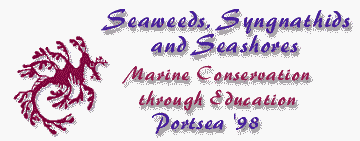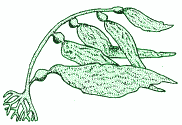 |
 |
Abstracts of Conference Papers
Fridays Abstracts
Mangroves and Marshes
Norm Walker
Manager, Tooradin Marine Life Centre
TOORADIN 3980Christopher Harty
Manager Environment and Planning
Corangamite Shire Council. P O Box 84
CAMPERDOWN 3260
Mangroves are the salt tolerant forest ecosystems of our intertidal shores. All too often however, mangroves have been regarded as wastelands of little or no value until they are developed.
However, mangroves can provide sustainable and reasonable benefits to coastal communities, which would be lost if such environments were otherwise converted to a non-renewable land use.
In planning and managing anymangrove resource, the primary goal must be sustainable use. Failure to view mangroves in this way will lead to inefficient use and waste of their values to coastal populations and will have severe and direct social, economic and ecological impacts. Education in the marine and coastal environment is one tool that can change public misconceptions about the value of mangroves.
Snorkelling the Subtidal
David Wailes and Aqua-Camps Staff
46 Canterbury Jetty Road
Blairgowie 3942
The theory component of this workshop consisted of discussions of:
Education Department standards and ratios, definitions and interpretations of these standards, training options safety protocols, equipment, program structure suggestions, theory topics and practical skills, training your group, open water diving organisation and options, how to make it interesting and challenging for your group.
The practical component included a touch tank session, skills training and check-out, practical activity options for your group, pier dive and animal investigation.
Seashores & Middens
Jim Bowler
Professorial Associate
School of Earth Sciences
University of Melbourne
Marine and coastal educators ideally spend a fair bit of time on the shore but how many of us stop to consider our surroundings - the cliffs that we may scramble down, the coastal dunes that we wonder through or the shore platforms on which we spend our time rockpooling.
This workshop focused on these important but ‘less studied’ elements of Australia’s coastal environment. Using the Port Phillip region as a setting, the influence of past events, such as sea level change, explained the formation of coastal dunes and shore platforms. As part of this process of looking back in time, a secondary theme based on Aboriginal culture and the coast was developed.
Incredible Invertebrates
Reg Lipson
Sea - Studies Services
46 Wildewood Avenue
Vermont South 3133
Australia’s seashores, be they temperate or tropical, offer a wonderful opportunity to study invertebrates. In southern Australia, low tide on almost any rocky shore provides us with access to an incredible diversity of slithering, scuttling, sedentary, stinging, slimy and a thousand other ‘kinds’ of invertebrates.
In this workshop, Reg Lipson, Marg O’Toole and Jane Breidahl shared their own hands-on approaches to a world seldom visited and one where truth is often stranger than fiction. The key element of Reg, Marg and Jane’s approach was one of opening our eyes and minds to the incredible life of marine invertebrates.
Southern Seaweeds
Professor Margaret Clayton
Department of Biology Sciences
Monash University
Clayton 3168
| Southern Australian waters are becoming well known for the incredible diversity in both marine plants and animal species. The diversity of seaweeds on our southern shores, however, is something many of us fail to recognise or simply take for granted - rockpools richly decorated with brown, red and green seaweeds of all shapes, sizes and patterns may often be passed over because they are common place. |  |
This workshop began with a discussion of the southern Australian seaweeds and the concept of biodiversity and was followed by a practical session involving hands-on work with a range of common seaweeds.